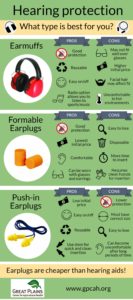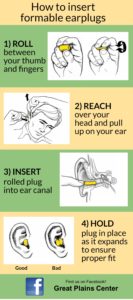Hearing loss caused by exposure to noise is common in farmers and agricultural workers –
once it occurs it is permanent and irreversible. Common sources of hazardous noise include
tractors, grain dryers, combines, livestock, chainsaws, and firearms. Noise that leaves ringing
 in the ears, a temporary reduction in hearing, or requires voices to be raised is too loud.
in the ears, a temporary reduction in hearing, or requires voices to be raised is too loud.
The control of exposure to noise can be accomplished in a number of ways such as reduction
of sound levels, performance of routine maintenance, the use of personal protective equipment (PPE),
or implementation of administration controls like isolation from noise or limitation of daily exposure time.
PPE can be found in the form of either disposable or reusable earplugs and earmuffs.
Hearing loss is not reversible once it has started but can be prevented from getting worse.
Visit an audiologist who will perform an audiogram to help detect and diagnose hearing loss.
In summer 2019, I-CASH distributed an informational card about selecting a proper hearing
protection device and how to insert formable earplugs. The card was created by the
Great Plains Center for Agricultural Health. In addition to the card, ISUEO and FSA
offices across the state received formable earplugs for distribution.

